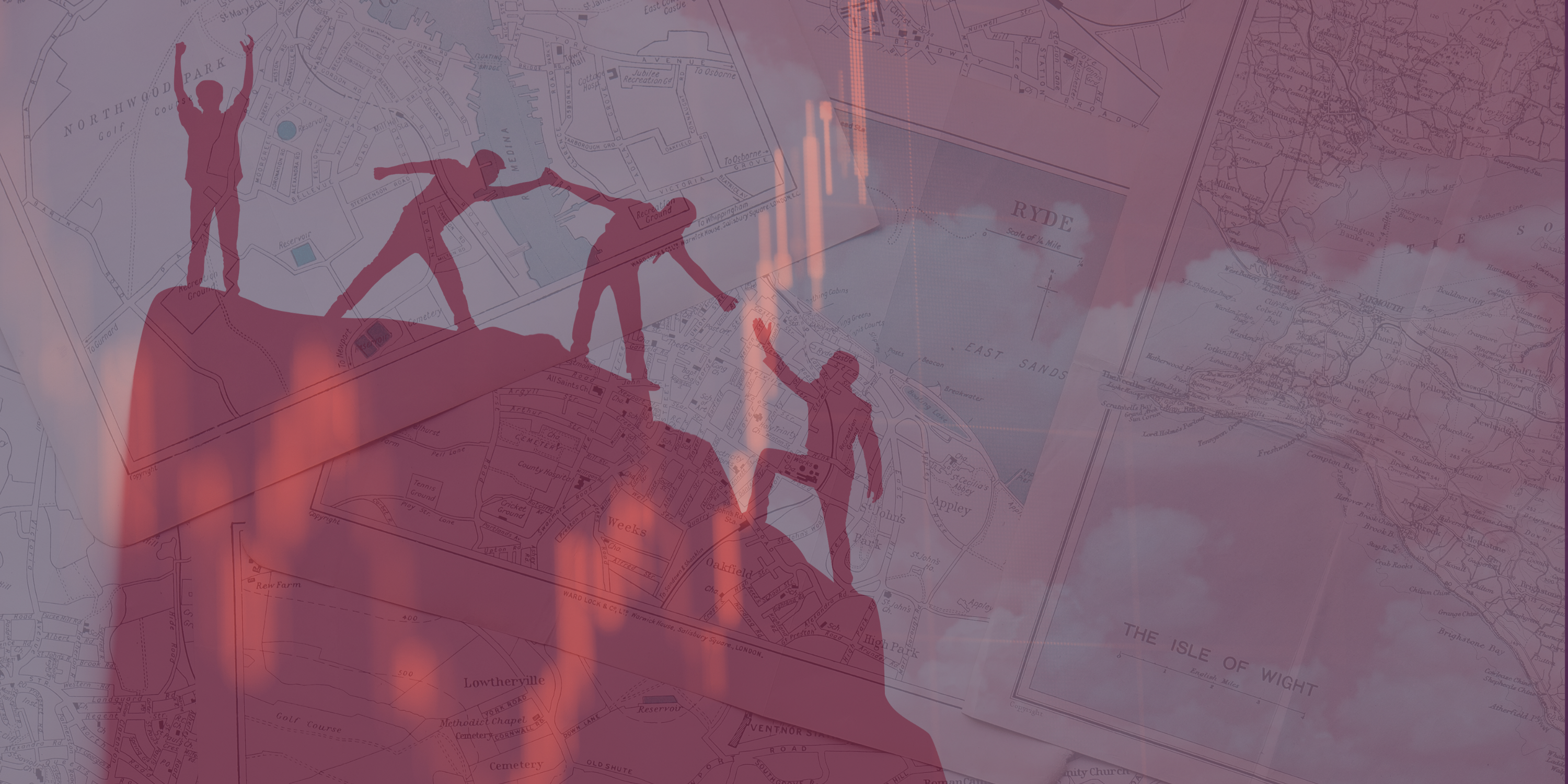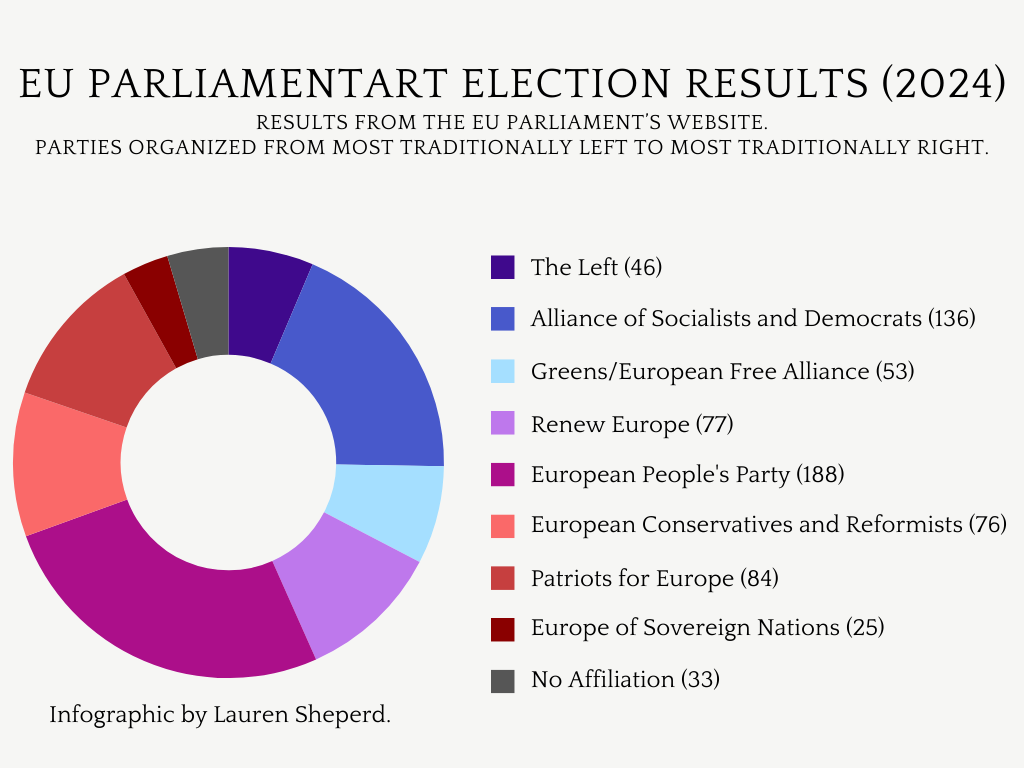America is not alone in a rightward political shift in the last decade
Both elections of President Donald Trump in the United States have been consistent with global patterns of a rightward shift in politics as anti-immigrant and populist rhetoric has become more mainstream.
In elections across the world — such as the European Union (EU) parliamentary election in 2024, South Korean presidential election in 2022 and the Argentine presidential election in 2023 — candidates elected have often come from far-right parties or have adopted far-right, previously fringe rhetoric in a similar way to Trump.
Elections for the EU Parliament — the EU’s legislative body — took place last year from June 6 to June 9, depending on the country. Overall, the 720 seats in the parliament that represent 27 member-states remained more central than expected.
According to the Center for American Progress, the campaigns of the far-right parties — European Conservatives and Reformists (ECR) and Identity and Democracy (ID) — made significant gains while progressive left parties — Renew Europe (RE) and Greens/European Free Alliance (G/EFA) — saw significant losses. Meanwhile, the European People’s Party (EPP) and Socialists and Democrats (S&D) maintained a significant majority with their voter shares remaining pretty much the same.
The most notable far-right gains came from France, Italy and Germany, all countries that have seen significant influxes of migrants from Ukraine, Syria and other countries facing significant violence.
According to Shiera Malik, associate professor of international studies at DePaul, anti-immigrant sentiment often has to do with a loss of social services and government support paired with increased immigration. “People in their daily lives are seeing a reduction in welfare services,” Malik said.
Outside of the EU, European countries have faced rightward shifts in their own national political landscape. In Germany and Austria, the far-right groups Alternative for Germany (AfD) and Freedom Party (FPÖ) made significant gains in their respective countries.
According to the Council on Foreign Relations (CFR), a think tank focused on U.S. foreign policy, the FPÖ was founded by a prior “SS officer and Nazi lawmaker” and seeks to stop immigration to Austria, end sanctions on Russia, stop sending aid to Ukraine and reclaim powers that have been delegated to the EU. The FPÖ now controls 53 of Austria’s 183 parliament seats; that’s more than any other party.
While the AfD in Germany does not have as much historical significance — it was only founded in 2013 — it has the same hyper-nationalistic values as the FPÖ. According to the CFR, “it gained support after adopting a xenophobic and Islamophobic stance during the refugee crisis in 2015.” Most support for the AfD comes from formerly communist-occupied East German states such as Thuringia, Brandenburg and Saxony.
Germany has been facing large amounts of anti-immigrant rhetoric, Malik said. This is due to their policy regarding Syrian refugees created by former Federal Chancellor Angela Merkel. During the height of the refugee crisis in 2015 and 2016, Germany allowed more than 1.2 million refugees to seek asylum within its borders.
South Korea and Argentina have also seen far-right parties win elections for each country’s executive branch.
With promises of national unity, South Korean President Yoon Suk Yeol of the conservative People’s Power Party (PPP) won the presidency in March 2022. Following a bitter political showdown involving all-too-familiar mocking and demonizing of the opposing candidate, Yoon beat his opponent, Lee Jae-myung of the Democratic Party, by less than one point.
Now, almost three years have passed since Yoon’s election and swearing in, and he has been impeached and is on trial for attempting to implement martial law in the country last December. According to Al Jazeera, Yoon is currently incarcerated for “charges of leading an insurrection through his attempt to enact martial law.”
Prior to his impeachment, Yoon was in a constant political standoff with the opposition party that controls the South Korean parliament. He has aligned himself with a wave of anti-feminism in South Korea. He also has tried to clamp down on disinformation, though this is often seen as restrictions of free speech, according to the New York Times.
Relations with neighboring North Korea have also worsened significantly since Yoon took office as he began a more confrontational approach and tried to infiltrate the information blackout there.
President Javier Milei won his race in Argentina in November 2023, officially becoming the president of the South American country of over 46 million people a month later. Milei is a self-proclaimed anarcho-capitalist, according to the Journal of Democracy, and won almost 56% of the vote.
Milei’s candidacy came during a time of extreme economic crisis in Argentina, with huge rates of inflation, poverty and 86% of the country thinking the economy was doing badly, according to polling. This led to a disdain for the incumbent party among voters and the desire for something new — a pattern that often leads to extreme politics.
Having no established connection to any of the Argentine political parties, Milei created his own called the Liberty Advances party. With only two years of political experience in Argentina’s congress before his election, his candidacy matched “drain the swamp” rhetoric common in America, particularly during Trump’s first candidacy.
Milei was the first far-right president to be elected in the country’s history, and his policies take an extreme, small-government approach. Some of his campaign promises include privatizing all healthcare and education and a free market for selling and buying organs and children. He also promised more freedom to buy firearms.
So far, confidence in the government and economic optimism have grown since Milei took office, according to Gallup Polls. After a brief period of extreme inflation following Milei’s inauguration, rates have dropped to 3.9%. However, Argentina’s inflation rates are still drastically over those of most other countries, and poverty rates among the regular people of Argentina have grown. Overall, the richest Argentinians are the most approving of Milei thus far.
While not all countries have seen right-wing parties take charge like in Austria or South Korea, many countries have faced parties that were historically centrist take right-leaning stances on important issues such as immigration and economics.
Last year, the Republic of Ireland had two highly important and contentious elections: one for their 14 seats in the EU parliament in June, and one for their own national parliament — the Dáil — at the end of November.
In the EU elections, Ireland voted mainly for the center-left party, Renew Europe, which lost 21 seats in total in the parliament. They also did not vote in any representatives from the far-right parties that dominated in countries such as France and Germany.
Despite this, the results of the national parliamentary election stayed stagnant party wise, rather than making the leftward shifts desired by so many young people on the island. According to Bronwen McDonagh, a student at Maynooth University and a Dublin native, the controlling parties — Fianna Fáil (FF) and Fine Gael (FG) — have been in charge of the government for decades, despite making no real progressive movement. “Always, one of them in the driver’s seat,” McDonagh said.
Ireland has a multi-party system, reliant on party coalitions to successfully run the government. Often, smaller parties will join the FF/FG coalition to strengthen their support and pull in the government. Following this election, it seems as if the Independents will be joining that coalition. “The independents are individual people who are running for seats during the election,” McDonagh said. “A bunch of the independents who have been running are right-leaning, or they are part of smaller groups that are more conservative.”
McDonagh is not just concerned with the coalitions being formed by the most mainstream parties with more conservative ones, but the actual policy of FF and FG — led by Simon Harris and Micheál Martin respectively — becoming more conservative. In the last Dáil, which lasted from 2020 to 2024, promises made by FG to legalize marajuana and sign The Occupied Territories Bill — which would limit trade with Israel — never came to fruition. Instead, policy from the two major parties have focused on helping the rich and hedge funds.
“They don’t try and do anything that’s for the people who are working class,” McDonagh said.
Ireland has also seen a rise in anti-immigrant rhetoric, largely due to the over 100,000 Ukrainian immigrants accepted by the country. Living costs in Ireland have also skyrocketed, particularly for young people. According to the Irish Times, more than 60% of 25-year-olds still live at home with their parents due to high housing costs. In Malik’s analysis, this formula is perfect to create far-right sympathy in a country.
McDonagh worries that the rightward shift she’s seen in her country is also due to large amounts of press coverage of the United States and Trump. “It’s also invigorating right-wing movement,” she said. “Not even in a political standpoint, but in an anti-everything movement. It’s creating these kind of rip currents that are dragging loads of people with it.”
Header by Anna Retzlaff





NO COMMENT